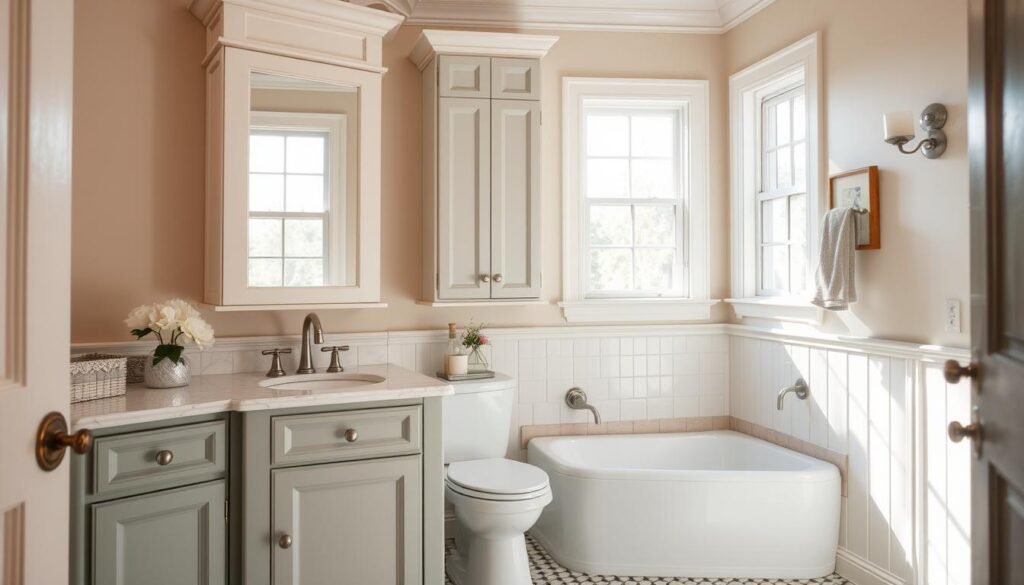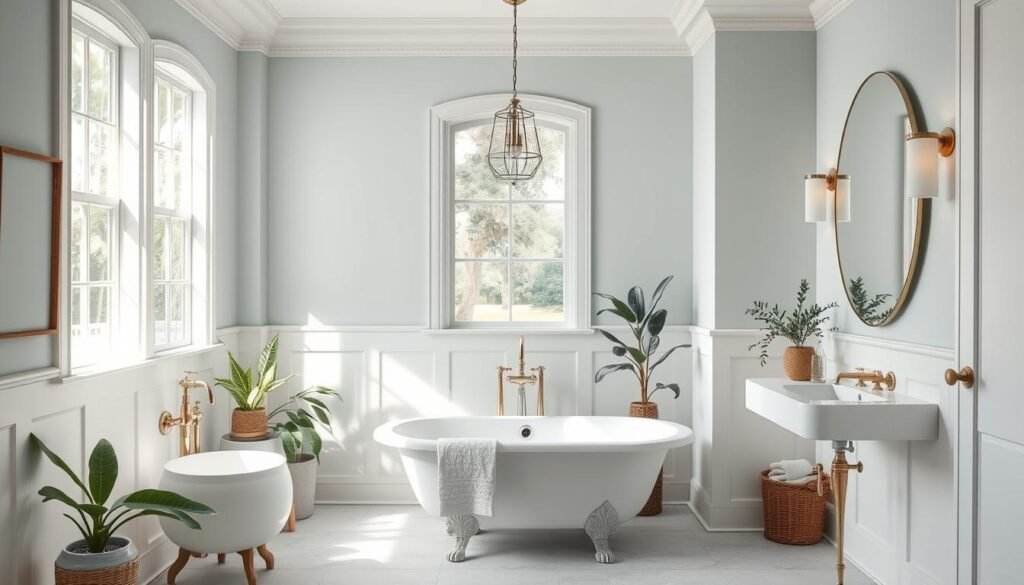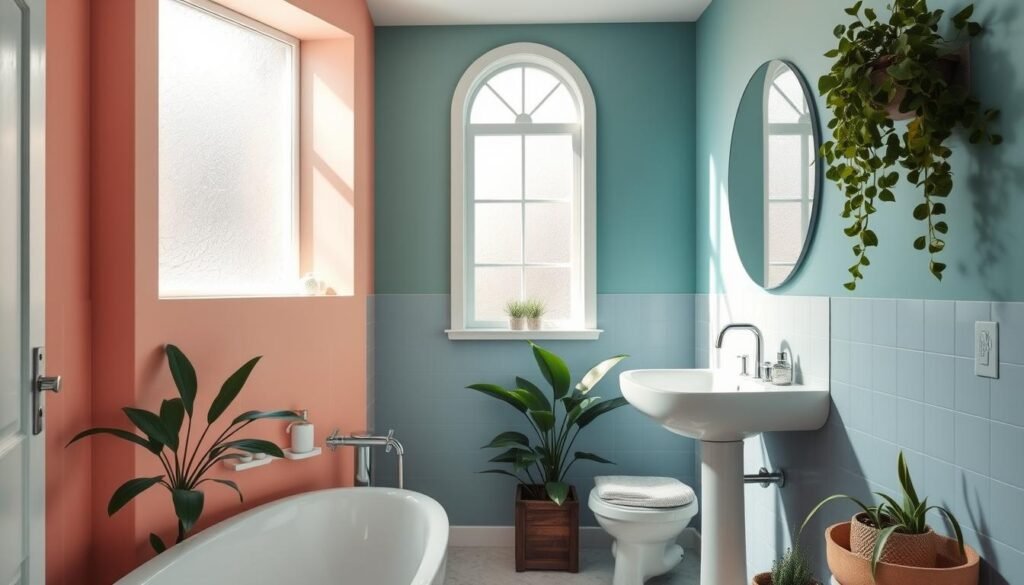The right paint can transform your bathroom’s look. Bathrooms need special paint due to moisture and humidity. Quality bathroom paint enhances appearance and protects against mold and water damage.
Selecting paints made for high-moisture areas is crucial. Many brands offer specialized bathroom primers and paints. These products contain mildew-resistant additives and provide superior moisture resistance and durability.
Table of Contents
ToggleKey Takeaways
- Choose moisture-resistant paints with mildew-killing properties for bathrooms
- Look for water-based latex paints in semi-gloss or satin finishes for optimal performance
- Avoid flat or matte finishes, as they are more prone to moisture infiltration and mold growth
- Consider the existing paint condition and choose the right primer for a long-lasting finish
- Explore a wide range of color options from trusted brands like Benjamin Moore to create your desired bathroom ambiance
Pick the right bathroom paint and follow proper preparation methods. This approach can create a beautiful, moisture-resistant space. Your bathroom makeover can be both stunning and functional.
With the right paint, your bathroom will look great for years to come. It will resist moisture and be easy to clean.
Learn more about choosing thebest bathroom
Importance of Bathroom Paint
The right bathroom paint can transform your space. Bathroom paint shields walls from high humidity. It prevents moisture from damaging your walls and causing peeling.
Glossy finishes resist moisture better. They form a hard, water-repellent coating when dry. This helps water drip to the floor instead of seeping into walls.
Low-sheen paints like flat or eggshell absorb moisture easily. They’re more prone to mold and mildew growth. These finishes aren’t ideal for high-moisture areas like bathrooms.
“The use of high-quality paint in bathrooms can prevent moisture absorption, leading to mold and mildew issues.”
Choosing the right bathroom paint is crucial. It keeps your bathroom clean and mold-free. Look for paint that fights moisture and stops mold growth.
This will keep your bathroom walls looking great for years. Your bathroom will stay beautiful and functional with the proper paint choice.
Types of Bathroom Paint
Latex Paint
Latex paint is a top pick for bathrooms. It’s durable, resists moisture, and cleans up easily with water. Most latex paints now have low or no VOCs, reducing toxic fumes during drying.
You can easily wipe away splatters on latex paint surfaces. Its moisture resistance makes it ideal for humid areas like showers and sinks. Latex paint applies smoothly and dries quickly, perfect for bathroom makeovers.
Oil-based paint is another option for bathrooms. It’s extremely durable, making it great for high-traffic areas like cabinets. However, oil-based paint may yellow over time and releases more VOCs.
“Latex paint is durable, washable, and moisture-resistant. It applies easily, and clean-up is simple because only water is needed, not harsh solvents.”
Sheen Levels for Bathroom Paint
Satin and semi-gloss paint finishes are top choices for bathrooms. They balance looks and durability. Choosing the right bathroom paint sheen is crucial for a successful renovation.
Semi-gloss paint is highly recommended for bathrooms. It’s durable and resists moisture well. This makes it perfect for high-humidity areas like bathrooms.
Satin finish paint is also a good option. It’s washable and moisture-resistant. Eggshell and satin sheens work well in low-traffic bathrooms.
Avoid using flat/matte paint finishes in high-traffic, moist bathrooms. They’re less durable in these conditions. However, some premium flat paints can handle cleaning better.
The best paint finishes for bathrooms are eggshell, matte, satin, sheen, and semi-gloss. Semi-gloss is often seen as the most practical choice. Choose based on your bathroom’s specific needs and usage.
Mold and Mildew-Resistant Bathroom Paint
Mold-resistant paint keeps your bathroom healthy and attractive. These paints stop harmful fungi growth. They keep your bathroom fresh and clean longer.
These paints contain fungicides to kill mold spores. They cost more than regular paint but offer long-term benefits. According to the Centers for Disease Control, mold or mildew on bathroom walls is a potential environmental and health hazard.
Choose eggshell or satin gloss finishes for better water resistance. Semi-gloss and high-gloss paints offer even more protection. They’re excellent for bathrooms.
Mold-resistant paint costs about $40 per gallon or $15-$20 per quart. Premium options like Benjamin Moore’s Aura Bath and Spa cost $89.99 per gallon.
Remember, mold-resistant paint doesn’t guarantee mold elimination. Regular cleaning is still crucial. Before painting, clean affected areas with bleach and water.
- Mold-resistant paint contains fungicides that kill mold and mildew spores before they can develop.
- Eggshell and satin gloss finishes are more water-resistant, while semi-gloss and high-gloss paints offer even greater protection.
- Mold-resistant paint typically costs between $15 and $40 per quart, with premium options like Benjamin Moore’s Aura Bath and Spa priced at $89.99 per gallon.
- Regular cleaning and maintenance are still essential, as mold-resistant paint does not guarantee the complete elimination of mold or mildew.
Quality mold-resistant paint is a smart bathroom investment. Proper paint selection and surface prep create a hygienic, appealing bathroom. Your efforts will result in a lasting, beautiful space.
Bathroom Paint for Cabinets and Trim
Transform your bathroom with the right paint for cabinets and trim. Choose high-quality, moisture-resistant paint to withstand humidity and daily wear. Satin, semi-gloss, or high-gloss finishes offer durability and resist chipping and peeling.
Benjamin Moore ADVANCE delivers a smooth, factory-like finish. It resists chipping and provides long-lasting protection for your bathroom cabinets.
Other great options include Sherwin-Williams Emerald Urethane Trim Enamel and Behr Premium Cabinet and Trim. These paints offer excellent durability and resist moisture, mildew, and grime.
For bathroom trim, try self-leveling paint like Valspar Cabinet Enamel. It provides a smooth finish that resists scratches and moisture.
Consider General Finishes Milk Paint or Farrow & Ball Modern Eggshell for ultra-durable, water-based options. These paints offer excellent protection for your bathroom surfaces.
Apply a clear, water-based polyurethane topcoat to protect your painted cabinets and trim. Try General Finishes High-Performance Water-Based Topcoat or Minwax Polycrylic Protective Finish.

Proper surface preparation is crucial for painting bathroom cabinets and trim. Sand and clean surfaces thoroughly. Apply a high-quality primer before painting.
With bathroom-specific paint and attention to detail, you’ll achieve a stunning, long-lasting finish. Your bathroom will look and feel completely transformed.
bathroom paint
Proper preparation is key for a professional bathroom paint job. Use a primer as the first coat. Primers prepare the surface and prevent paint bubbling or peeling.
Most primers need 24 hours to dry fully. Choose primers made for bathrooms or kitchens. These resist water and mildew effectively.
- Use a primer marked as bathroom or kitchen primer, or a specialty primer designed for water- or mildew-resistance.
- Allow the primer to dry for 24 hours before applying the first coat of paint.
- Proper surface preparation, such as cleaning and deglossing, can help the paint adhere better and prevent future issues.
After priming, apply your chosen bathroom paint. Use a high-quality brush or roller for even coats. Apply thin layers for a smooth finish.
Allow enough drying time between coats. Follow the manufacturer’s instructions carefully. This ensures the best results for your project.
Focus on bathroom paint application, techniques, and preparation. This creates a beautiful, durable, and mold-resistant bathroom. Your efforts will result in a long-lasting finish.
Bathroom Paint Colors
Neutral and Soft Colors
Bathroom paint colors can vastly transform your space. Neutral and soft shades are popular choices for creating a peaceful atmosphere. Whites, off-whites, soft greens, pale blues, and light grays can make your bathroom feel calm and relaxing.
Neutral colors complement various interior styles and enhance natural light. They can make small bathrooms appear more spacious. These hues pair well with different design elements, from vintage fixtures to modern vanities.
Darker colors can add a touch of drama and sophistication to your bathroom. They create a bold contrast against lighter elements in the space.
| Color | Perceived Atmosphere | Designer Recommendations |
|---|---|---|
| Sage Green | Calming and Tranquil | HGTV Home by Sherwin-Williams’ Quietude |
| Soft White | Serene and Soothing | – |
| Light Gray | Clean and Timeless | – |
| Pale Blue | Tranquil and Refreshing | – |
| Beige | Warm and Bright | – |

Neutral and muted colors can create a serene atmosphere in your bathroom. Choose a classic white palette or soft, earthy tones. Pair these colors with thoughtful design elements for a visually appealing and functional space.
Small Bathroom Paint Tips
Paint choice can make a big difference in small bathrooms. The right color and sheen can transform the space completely. Consider several factors for a successful small bathroom makeover.
Start by checking the bathroom’s current condition. Is it new or previously painted? Many small bathrooms have glossy finishes. These need special primer for new paint to stick well.
Experts suggest light neutrals, soft pastels, and soothing greens for small bathrooms in 2024. Brands like Glidden, Lick, Valspar, Benjamin Moore, HGTV Home by Sherwin-Williams, Behr, and Sherwin-Williams offer great paint options.
Think about the mood you want to create when picking a color. Light colors like Hikers Paradise and Decorator’s White can open up small spaces. Bolder choices like Aleutian, Arizona Dust, and Everglade Deck add depth and character.
Sheen level matters too. Satin and semi-gloss finishes work well in small bathrooms. They’re more durable and easier to clean than flat or eggshell paints.
Add contrasting elements to complete the look. Try dark wood vanities, warm-toned floor tiles, or matte black hardware. Crisp white trims, rattan accents, and brass fittings can also enhance the space.
Consider marble countertops and polished chrome accents for extra style. These touches create a cohesive and appealing bathroom. Focus on small bathroom paint ideas, color schemes, and painting tips for best results.
Bathroom Painting Preparation
Proper preparation is vital for a flawless bathroom paint job. Clean, dry surfaces are essential before painting. Let’s explore the key steps for a beautiful, long-lasting bathroom transformation.
Cleaning and Mildew Removal
Addressing mildew or mold growth is crucial in bathroom painting prep. Scrubbing mildew with a bleach and water solution is better than painting over it. This eliminates the underlying issue and creates a clean canvas.
Use a quality mildew-resistant primer before applying your final paint color. This step ensures better paint adhesion and longevity.
Choosing the Right Primer
For new construction, select a primer made for drywall. A drywall primer prepares the surface to accept paint properly. This ensures a smooth, long-lasting finish on your bathroom walls.
Preparing the Surfaces
- Use sandpaper to remove flaking or peeling paint, creating a smooth surface.
- Fill cracks or holes with spackling compound and let it dry before sanding.
- Wipe walls with a sugar soap solution to remove dirt, grease, or residue.
- Protect fixtures with painter’s tape for a clean, crisp finish.
These bathroom painting prep steps set the stage for success. Your bathroom will be transformed into a beautiful, rejuvenated space.
Bathroom Painting Techniques
Thorough preparation is crucial for a lasting, quality bathroom paint finish. Clean walls with bleach and water to remove soap scum. This ensures better paint adhesion.
Remove switch plates, mirrors, and other hardware before painting. This allows for a more professional look. Use painter’s tape to protect areas you don’t want painted.
Use a 2-inch sash brush for edges and a roller for larger surfaces. Allow enough drying time between coats. Aura® Bath & Spa paint needs 24 hours before the next hot shower.
Choose high-quality paint for better results. Benjamin Moore’s Kitchen & Bath line offers a durable satin finish. These formulas contain more solids, improving longevity and resistance to moisture.
Following these bathroom painting best practices ensures a great-looking, long-lasting paint job.
- Paint roller and 2-inch sash brush
- Paint tray and liner
- Flathead and Phillips screwdrivers
- Plastic sheeting
- Roller cover
- Interior latex paint formulated for bathrooms
- Painter’s tape
With proper prep, tools, and paint, you can give your bathroom a fresh new look. Your efforts will result in a beautiful, long-lasting paint job.
Conclusion
Choosing the right bathroom paint is crucial for a beautiful, functional space. Consider moisture resistance, sheen level, and color to create a serene oasis. Valspar, Crown, and Dulux offer specialized paints for high-humidity environments.
Proper surface preparation and a high-quality primer are essential for durability. Satin and semi-gloss finishes resist moisture and prevent peeling. These smooth surfaces also help fight mold growth.
Light colors can make small bathrooms feel larger. Darker hues create an intimate, luxurious atmosphere. Test paint samples in your bathroom’s lighting before deciding.
The right paint selection can elevate your bathroom remodel or bathroom renovation. Transform your personal retreat into a stunning, practical space. Your bathroom will reflect your style and stand the test of time.
FAQ
What are the key factors to consider when choosing the best paint for a bathroom?
The best bathroom paint tackles wet and humid conditions. It prevents mold growth, resists mildew, and stays attractive long-term. Use a mold-resistant primer and moisture-resistant latex paint. Choose a semi-gloss, satin, or eggshell finish for best results.
Why is humidity a concern for bathroom paint?
Humidity threatens paint’s look and performance. Moisture can seep between the wall and paint, causing unwanted texture and peeling. Glossy finishes resist moisture better than low-sheen paints like flat or eggshell.
What type of paint is best for bathrooms?
Latex paint is ideal for bathrooms. It’s durable, washable, and moisture-resistant. Latex paint is easy to apply and clean up with just water. Most latex paints have low or no volatile organic compounds.
What is the best finish for bathroom paint?
Semi-gloss or gloss finishes work best in bathrooms. Semi-gloss paint is shiny and easy to clean. It contains more resins and binders than flat paint. Gloss paint has the toughest sheen and handles scrubbing well.
How does mold-resistant paint work in the bathroom?
Mold-resistant bathroom paint is water-resistant and contains fungicides. It sheds moisture effectively, especially in semi-gloss and high-gloss finishes. The fungicides kill mold and mildew spores before they can grow.
What is the best paint for bathroom cabinets and trim?
High-quality paint is crucial for bathroom cabinets. Satin, semi-gloss, or high-gloss finishes are recommended for moisture exposure. Benjamin Moore ADVANCE, a waterborne alkyd paint, works perfectly for cabinets.
What types of primers are recommended for bathrooms?
Use a primer before painting to prepare the surface. It prevents bubbling and peeling, even on glossy surfaces. Choose a bathroom, kitchen, or water-resistant primer for best results.
What are the best bathroom paint color choices?
The best color depends on your design preferences. Popular choices include whites, off-whites, soft greens, pale blues, and light grays. Neutral colors complement any interior palette and enhance natural light.
How should you prepare the surface before painting a bathroom?
Clean and remove mildew before painting. Scrub with a bleach and water solution. Use a quality mildew-resistant primer. For new construction, choose a primer based on the surface type.
How long should you let bathroom paint cure before use?
Allow bathroom paint to fully cure before exposure to moisture. AURA Bath & Spa needs at least 24 hours to dry. Proper preparation and choosing the right paint ensures a long-lasting, mold-resistant finish.

